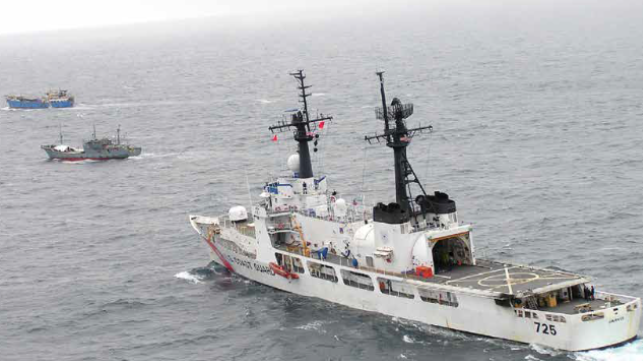NOAA Joins USAID in Effort to Combat IUU Fishing Overseas

The National Oceanic and Atmospheric Administration (NOAA) is joining the U.S. government's effort to fight illegal fishing in far-flung waters. NOAA has entered into an agreement with the U.S. Agency for International Development (USAID) to combat illegal, unreported and unregulated fishing (IUU fishing) across borders and to promote sustainable fisheries abroad.
The two agencies plan to expand on their existing programs, strategies and investments in order to support developing countries' efforts to strengthen their own enforcement capacity; promote private sector and government innovations to combat IUU fishing; and heighten both the positive incentives for compliance with fisheries rules and the negative consequences for violations.
The agreement builds on progress made under the Maritime Security and Fisheries Enforcement (SAFE) Act of 2019, which requires multiple agencies to form a joint working group on maritime security and counter-IUU fishing measures. Over the past year, NOAA has been working with the U.S. Coast Guard and the Department of State under this framework.
“Together, our two agencies are well positioned to help nations combat IUU fishing practices which have emerged as a leading maritime security threat and are associated with human rights abuses and other forms of transnational crime,” said Rear Adm. Timothy Gallaudet (USN, ret'd), assistant secretary of commerce for oceans and atmosphere and deputy NOAA administrator. “I commend the staff of NOAA and USAID who worked to develop this agreement, and thank all those who work every day to stop IUU fishing through diplomacy, enforcement, and science.”

that matters most
Get the latest maritime news delivered to your inbox daily.
The USAID-NOAA understanding also mirrors the objectives of a new joint U.S. Navy-Coast Guard strategy on global maritime strategy and the rule of law on the high seas.
NOAA Fisheries is already engaged in the fight against IUU fishing in several ways. Through regional fishery management bodies and international partnerships, it works with other nations to strengthen enforcement measures and data collection programs targeting IUU fishing activity. It also helps implement measures that restrict port access for vessels that are believed to be engaged in illegal fishing, and it manages reporting and record-keeping measures that are intended to keep illegally-caught seafood out of the U.S. market.
